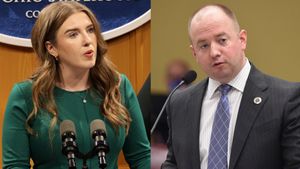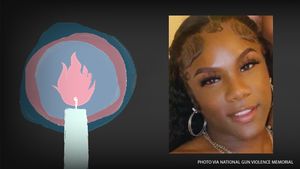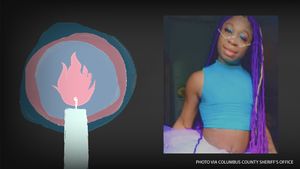With the recent release of their sixth full-length album and more than 10 years of touring behind them, there’s no doubt that Tegan and Sara have more music left in them. The prolific indie-rock band wrote like mad for more than two years to chisel out the perfect tracks for
Sainthood—narrowing it down from 51 songs to the chosen 13 that made the cut. Deeply inspired by their time spent in the Big Easy, everyone’s favorite sisters from Canada laid down tracks born of love and devotion a la Leonard Cohen’s “Came So Far For Beauty.” They even managed to throw in “Northshore”—a Tegan and Sara-style throwback to punk—which is reminiscent of the days when T&S would arrive home from a mosh pit and have to safety-pin their clothes back together for the next show.
Before embarking on a five-month tour through Europe, Canada, and the United States, Tegan and Sara played four special shows—two in L.A. and two in New York. We caught up with Tegan just after she’d finished belting out “Jolene” by Dolly Parton alongside Sara who crooned Jon Bon Jovi’s “Dead or Alive” in a New York karaoke bar for MTV News. When we talked to Tegan, we got her to dish on her obsession with hot dogs, becoming more mainstream, and slowly becoming licensed to drive.
SheWired: When I last talked to you, you were working on getting your driver’s license. Did you get it yet?
Tegan: I didn’t. God. That’s so embarrassing. I studied for the test and just got really busy. I have a lot of things I was hoping to get done, and as I was leaving Vancouver a week and a half ago to start this six-week run, my mom and I were going over the list—because my mom acts as a contractor for me sometimes. There’s so many little things that I just get bogged down with and I am such a workaholic, I just end up doing work stuff. There are these little, simple, stupid things like getting the toilet fixed or doing this or doing that, and Mom’s always like, “I’ll do it, I’ll do it.” She doesn’t work on Fridays, so she’s like, “I’ll do it on Friday.” So maybe I could just get my mom to go and take my driver’s test for me and pretend she’s me.
SW: With the first two shows out of the way, do you guys feel a little more confident to play your new material?
T: Definitely. I’m always nervous for New York and L.A. It’s a big deal. There are a lot of record company people out. Sara and I have spent 99% of our career not worrying about press, journalists, and record companies, but when you play in New York and L.A. you can just abandon all of that—or you have to—because it is super important. I want the label to care. I want them to be behind the record, so I want them to be impressed by the live show. We have such an amazing, wonderful, intensely loving and devoted audience and there are lots of people in the media who are part of that audience.
There’s definitely a lot of ground we want to cover with this record. Sara and I are prepared and fully ready to crack even more of the mainstream, because we know there are more people who would really connect intensely with our band if they just knew about it. So that means kind of sucking it up and doing a lot more press, radio, and handshaking, which is fine. We’re outspoken and we’re feminists and we’re strong role models for women and for queer culture, and I think it’s time for the mainstream to have a little more of that.
Video courtesy of
Jaime Wojdowski
SW: Speaking of mainstream—have you had a defining moment when you knew you’d made it?
T: We were in the airport yesterday flying from L.A. to New York and I was flipping through
Spin because The Flaming Lips were on the cover. We were the lead review in Spin, and there’s this big caricature of us. I put the magazine back on the rack and walked away and I was like, “That’s cool. Wow.”
There are moments like that and there are moments when you’re playing at the Orpheum in L.A. two nights in a row to a crazy, excited, enthusiastic, sing-along crowd, and you’re like, “Wow. We’ve really come a long way.” I remember playing at tiny little venues in L.A. to 10 industry people in 1999, and being like, “One day I’ll have a career.” That’s more important to Sara and I than anything else—more important than being rich or famous or selling lots of records. It’s just about having a career and making music we love, which, ultimately, we always get to do. We still retain 100% artistic control over our project and our music and that is a coup at this point. Most bands last 10 years&md
ash;that’s it. We’re just getting started and it feels really exciting.
SW: How was it collaborating with Sara on songs for the first time during your session in New Orleans?
T: A lot of the songs we wrote in New Orleans are really weird and really amazing, but they should really come out together. And that’s sort of a vibe Sara and I are putting out there in the world—that we’re probably going to release that as an EP separate from the record because we would have really had to reconstruct the songs, and it just felt weird. We did pick three or four of them to work on in pre-production. As we started to dismantle them and make them band songs, it felt really weird—I mean, they were recorded as a duo. Sara and I have moved far beyond duo status and we are a full rock band, but we still have that in us. I think there is going to be music in our future—not just from this New Orleans session—but I think that we are going to be a duo at some point again. I don’t know if it’s just going to be for a tour, or for one record, or whatever. We really like collaborating with each other—there’s definitely some strange music to come out of the collaboration of Tegan and Sara.
We were in pre-production for a month and then we recorded as a band in the studio, and the songs more than ever before really took on a whole different vibe. There’s definitely a lot more collaboration happening, which I think is just because we actually enjoy each other. At the beginning of our career we were teenagers and were striking out on our own, trying to figure out how to be autonomous while being in a band together. I think that more than ever before we’re really accepting each other and each other’s differences. I think our individualism has been really nurtured by the space that we’ve taken and you can really hear Sara’s influences on this record while still hearing mine, and they don’t feel like they’re blocking each other out in any way.
SW: How do you feel your writing processes differ?
T: Sara’s really meticulous—she writes very slowly. She spends an enormous amount of time and energy working out lyrics. She is extremely methodical about that. She takes intense care with everything she does. I’m not in any way saying that I don’t, but I’m much quicker. I write from a much more emotional place, and I have absolutely no problems working out lyrics. So it was really interesting to watch her record the way she did. I was definitely like, “Oh, that’s how you do it. OK, got it.”
SW: One of the catchiest songs on the album, “The Cure,” almost didn't make the cut—what happened?
T: It was a song I co-wrote with my friend Hunter Burgan who I write with all the time, and it was not a Tegan and Sara song. Let's just put it that way. It didn't really even sound like a Tegan and Hunter song. It was just a very weird, strange, instrumental and I didn't think it was very cool. And Sara loved it. She was like, “Oh, my god. I love the melody and the lyrics—the whole thing. I wanna rearrange it, speed it up, and change all the instrumentation.” I was like, “So basically write a new song?” And she was like, “Yeah.” I was really resistant because I was like, “This feels like a cover song or something. Like it doesn't feel like it's mine.” But as we worked on it more and more, we made it ours, and now it feels like a Tegan and Sara song.
SW: Can you tell me about the three books you’re putting out ON, IN, and AT?
T: About a year and a half ago I was brainstorming ideas to finish up this record. There was all this debate going back and forth about whether we should do a live concert and how we should wrap up the record. So much of our music is being sold or downloaded online and so much emphasis is put on digital, digital, digital. I was just like I want a tangible product—the way that when I was a kid I would go and buy the CD and then lie in my room and read the lyrics. I mean, the lyric books would get worn out. I started thinking about books and magazines. It started as an idea of doing a zine or a quarterly and then it turned into a book. After we finished shooting the first book—we shot photos and created content, and got essays from artists who had toured with us before—we were putting it together I was like, “Wow, this is actually really cool.” So we started drumming up other ideas to make other books and it became a box set. It took like a year and a half. It was so hard—harder than writing a record. It was this huge thing and we'd never done it before, so there was a huge learning curve. But they turned out amazing and I'm really happy with them.
Tegan and Sara Books
SW: Do you feel like you’re an inkblot master after completing 500 inkblots for the books?
T: You kind of just put ink on paper and fold it in half. Everyone swore they had a technique going. Sara was like, “This is what I do, and then I get ones like this, and blah, blah, blah.” And I was like, “Whatever, that just looks like the same thing I just did.”
SW: I heard you and Sara have a special place in your hearts for hot dogs. How did that come about?
T: Sara and I always make a joke about it because we grew up in a middle-class household. It started out lower middle-class, but we were raised by a single parent, feminist mom who was a social worker and went back to school when we were eight. My dad was still really involved, but we were with my mom six nights a week. While she was doing her Masters, she was so busy and we sort of were feeding ourselves and doing our own laundry. At eight we were virtually taking care of ourselves. We had supervision, but we were extremely supportive of my mother and didn't want to at all interfere with her schoolwork and her studies. So we used to pack our own lunches and bring cold hot dogs to school and soup packages and eat them dry. We'd play it up like we were basically borderline homeless, but they were choices we made because we didn't want sandwiches. When we walk past the street meat vendors on city streets, we make jokes like, “Oh, childhood.”
SW: When this article pops up on your mom's Google alert, is there anything you would like to say to her?
T: MOM, GET A LIFE! No, just kidding! I hope for every article I do and for every piece of press that's put out there that it's something that really…
Ultimately, it doesn't matter how much I say or how candid I am or how clearly I answer questions, it's still gonna be the writer's interpretation of me. We make jokes all the time about my mom going online and looking at Tegan and Sara press and obsessing over it because I think I get worried. I'm like, “Will my mom still love me when she reads someone else's impression of me? Will it change how she feels about me?” And even bigger than that, I worry about the world doing that. I don't really care what one person thinks about me, but I do care if that person is really influential and changes how other people think about me because I want everybody to apply their own instincts and their own knowledge of me. We do it half jokingly, but I'm kind of like, “Will my mom love me less if Pitchfork doesn't like us?”
Follow SheWired on Twitter!






























































































































